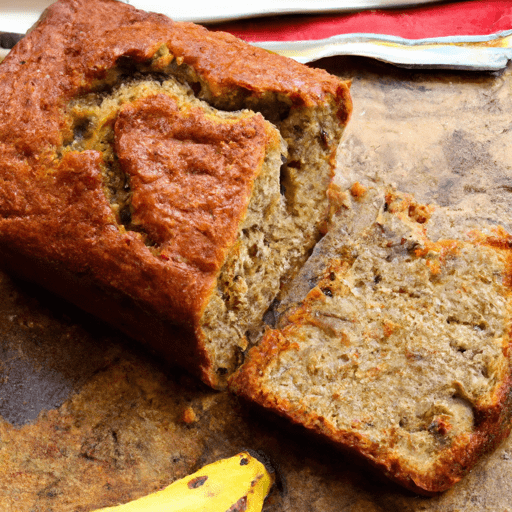The Delicious World of Banana Bread: A Perfect Sweet Treat
Have you ever experienced the joy of sinking your teeth into a warm slice of homemade banana bread? If not, you’re missing out on a delightful treat that’s both comforting and satisfying. Banana bread has captured the hearts of many food enthusiasts around the world with its moist texture, enticing aroma, and delectable flavor. In this article, we’ll dive into the enchanting world of banana bread, exploring its taste, common uses in cooking, nutritional value, and some intriguing historical facts.
A Taste Sensation like No Other
Banana bread is a moist and dense bread bursting with the natural sweetness of ripe bananas. The bread’s rich flavor is a delicate balance of sweetness and gentle tanginess, which only ripe bananas can achieve. It offers an irresistible combination of warm notes of caramelized banana, a hint of vanilla, and a subtle nuttiness from the addition of chopped walnuts or pecans. The moist crumb has a tender and soft texture that simply melts in your mouth. Every bite of banana bread is a heavenly experience that keeps you coming back for more.
Versatile and Delicious
Aside from being a delightful snack on its own, banana bread is a versatile treat that finds its way into various culinary creations. Here are a few common uses for this beloved bread:
Breakfast Bliss: Banana bread is a go-to breakfast option for many. Toasted and slathered with butter or cream cheese, it is the perfect companion to a steaming cup of coffee or tea in the morning. You can also top it with fresh fruits, yogurt, or a drizzle of honey for a nourishing start to your day.
Picnic Perfect: Banana bread is a popular choice for picnics and outdoor gatherings. Its portability and ability to stay fresh for a few days make it an ideal treat to pack along. Simply wrap individual slices, and you’re ready to go!
Creative Remixes: Banana bread can inspire delicious culinary experiments. Turn it into French toast, spread it with Nutella, or use it to make a luscious bread pudding. The possibilities are endless, and your taste buds will thank you for the creative twist!
Nutritional Value
Aside from its amazing taste, banana bread also offers some nutritional benefits. Ripe bananas, the star ingredient, are rich in vitamins, minerals, and fiber. They provide a natural source of energy and are known to boost mood and improve digestion. However, it’s worth noting that the addition of sugar, butter, and other ingredients can increase the overall calorie and fat content of the bread. Moderation is key to fully enjoy the benefits without compromising on taste.
A Brief Journey Through History
The roots of banana bread can be traced back to the Great Depression in the United States when resourceful housewives sought creative ways to use overripe bananas instead of wasting them. The first recipe for banana bread appeared in cookbooks in the 1930s, gaining popularity due to its simplicity and affordability. During World War II, banana bread became even more prominent as housewives learned to substitute scarce ingredients with bananas. Since then, it has become a timeless classic loved by people of all ages around the globe.
Conclusion
Banana bread is undeniably a wonderful treat that brings joy to our taste buds and warms our hearts. From its heavenly taste and versatility to its historical roots, there’s no denying the allure of this beloved bread. Whether you enjoy it plain, slathered in butter, or get creative with your toppings, banana bread is a true comfort food that never fails to satisfy. So why not whip up a batch yourself and indulge in the delightful world of banana bread? Your taste buds will thank you for it!
Origin of Banana Bread:
Banana bread originated in the United States during the Great Depression as a way to make use of overripe bananas that were too soft to eat. The recipe gained popularity because it required simple ingredients that were readily available.
Common Uses:
Banana bread is a popular quick bread that can be enjoyed as a breakfast, snack, or dessert. It is commonly served sliced and eaten on its own, and often toasted and spread with butter or cream cheese. It can also be used as a base for other desserts, such as trifles or bread puddings.
Nutritional Benefits:
Banana bread can be a source of several important nutrients. Bananas are rich in potassium, vitamin B6, and dietary fiber. They also contain some vitamin C, magnesium, and manganese. The exact nutritional content of banana bread can vary depending on the recipe and added ingredients.
Unique Properties or Historical Significance:
Banana bread is known for its moist and dense texture, which is achieved by using mashed bananas in the batter. The natural sweetness of bananas adds flavor and moistness to the bread.
A notable historical event related to banana bread is the publication of the first banana bread recipe in a 1933 cookbook published by Pillsbury. This contributed to the growing popularity of banana bread as a household recipe during the Great Depression.
It is worth noting that while banana bread is often enjoyed for its flavor and versatility, it is still a treat that should be consumed in moderation as part of a balanced diet.




Use the share button below if you liked it.
It makes me smile, when I see it.